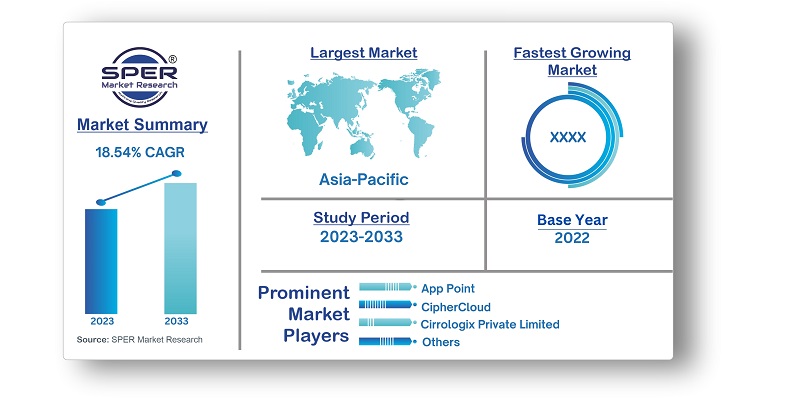
India Cloud Computing Market Growth, Size, Trends, Demand, Revenue, Share and Future Outlook
India Cloud Computing Market Size- By Service, By Deployment, By Enterprise Size, By End User- Regional Outlook, Competitive Strategies and Segment Forecast to 2033
| Published: Oct-2023 | Report ID: IACT23169 | Pages: 1 - 103 | Formats*: |
| Category : Information & Communications Technology | |||
- December 2022: A cooperation between InstaSafe, a major provider of cloud-based security services with headquarters in Bangalore, and ZNet Technologies, a world-wide distributor of cloud services, IT infrastructure, and cybersecurity solutions, has allowed InstaSafe to expand its product line across the Indian market. By utilising ZNet's broad partner network, InstaSafe will be able to access a larger market in India as a result of this partnership.
- November 2022: The AWS Asia Pacific (Hyderabad) Region, a second infrastructure area for Amazon Web Services (AWS) in India, officially opened on Tuesday. Businesses now have more options thanks to this second infrastructure region for managing workloads with increased resilience and availability, safely storing data in India, and providing end users with lower latency. AWS predicts that an investment of more than USD 4.4 billion (approximately 36,300 crore) in India by 2030 will support an average of more than 48,000 full-time jobs in the Hyderabad region.


| Report Metric | Details |
| Market size available for years | 2019-2033 |
| Base year considered | 2022 |
| Forecast period | 2023-2033 |
| Segments covered | By Service, By Deployment, By Enterprise Size, By End User |
| Regions covered | Ad Dawhah, AI Khor, AI Rayyan, AI Wakrah |
| Companies Covered | App Point, CipherCloud, Cirrologix Private Limited, Clogeny Technologies Private Limited, Ctrls Datacenters Limited, Infosys, iNube Software Solutions Pvt Ltd, Tata Consultancy Services, Wipro Limited, Zenith InfoTech Limited, Others |
- Data Scientists and Analysts
- Developers and IT Professionals
- E-commerce and Online Retail
- Healthcare and Life Sciences
- IoT (Internet of Things)
- Large Enterprises
- Media and Entertainment
- Mobile App Developers
- Small and Medium-sized Enterprises (SMEs)
- Startups and Entrepreneurs
- Others
| By Service: |
|
| By Deployment: |
|
| By Enterprise Size: |
|
| By End User: |
|
- India Cloud Computing Market Size (FY’2023-FY’2033)
- Overview of India Cloud Computing Market
- Segmentation of India Cloud Computing Market By Service (Infrastructure as a Service, Platform as a Service, Software as a Service)
- Segmentation of India Cloud Computing Market By Deployment (Hybrid, Private, Public)
- Segmentation of India Cloud Computing Market By Enterprise Size (Large Enterprises, Small & Medium-sized Enterprises)
- Segmentation of India Cloud Computing Market By End User (BFSI, E-Commerce, Energy & Utilities, Government & Public Sector, Healthcare, Manufacturing, Media & Entertainment, Telecom & IT, Others)
- Statistical Snap of India Cloud Computing Market
- Expansion Analysis of India Cloud Computing Market
- Problems and Obstacles in India Cloud Computing Market
- Competitive Landscape in the India Cloud Computing Market
- Impact of COVID-19 and Demonetization on India Cloud Computing Market
- Details on Current Investment in India Cloud Computing Market
- Competitive Analysis of India Cloud Computing Market
- Prominent Players in the India Cloud Computing Market
- SWOT Analysis of India Cloud Computing Market
- India Cloud Computing Market Future Outlook and Projections (FY’2023-FY’2033)
- Recommendations from Analyst
1.1. Scope of the report1.2. Market segment analysis
2.1. Research data source2.1.1. Secondary Data2.1.2. Primary Data2.1.3. SPER’s internal database2.1.4. Premium insight from KOL’s2.2. Market size estimation2.2.1. Top-down and Bottom-up approach2.3. Data triangulation
4.1. Driver, Restraint, Opportunity and Challenges analysis4.1.1. Drivers4.1.2. Restraints4.1.3. Opportunities4.1.4. Challenges4.2. COVID-19 Impacts of the India Cloud Computing Market
5.1. SWOT Analysis5.1.1. Strengths5.1.2. Weaknesses5.1.3. Opportunities5.1.4. Threats5.2. PESTEL Analysis5.2.1. Political Landscape5.2.2. Economic Landscape5.2.3. Social Landscape5.2.4. Technological Landscape5.2.5. Environmental Landscape5.2.6. Legal Landscape5.3. PORTER’s Five Forces5.3.1. Bargaining power of suppliers5.3.2. Bargaining power of buyers5.3.3. Threat of Substitute5.3.4. Threat of new entrant5.3.5. Competitive rivalry
5.4. Heat Map Analysis
6.1. India Cloud Computing Market Manufacturing Base Distribution, Sales Area, Product Type6.2. Mergers & Acquisitions, Partnerships, Product Launch, and Collaboration in India Cloud Computing Market
7.1. India Cloud Computing Market Value Share and Forecast, By Service, 2023-2037.2. Infrastructure as a Service (IaaS)7.3. Platform as a Service (PaaS)7.4. Software as a Service (SaaS)
8.1. India Cloud Computing Market Value Share and Forecast, By Deployment, 2023-20338.2. Hybrid8.3. Private8.4. Public
9.1. India Cloud Computing Market Value Share and Forecast, By Enterprise Size, 2023-20339.2. Large Enterprises9.3. Small & Medium-sized Enterprises (SMEs)
10.1. India Cloud Computing Market Value Share and Forecast, By End User, 2023-203310.2. BFSI10.3. E-Commerce10.4. Energy & Utilities10.5. Government & Public Sector10.6. Healthcare10.7. Manufacturing10.8. Media & Entertainment10.9. Telecom & IT10.10. Others
11.1. India Cloud Computing Market Size and Market Share
12.1. India Cloud Computing Market Size and Market Share By Service (2019-2026)12.2. India Cloud Computing Market Size and Market Share By Service (2027-2033)
13.1. India Cloud Computing Market Size and Market Share By Deployment (2019-2026)13.2. India Cloud Computing Market Size and Market Share By Deployment (2027-2033)
14.1. India Cloud Computing Market Size and Market Share By Enterprise Size (2019-2026)14.2. India Cloud Computing Market Size and Market Share By Enterprise Size (2027-2033)
15.1. India Cloud Computing Market Size and Market Share By End User (2019-2026)15.2. India Cloud Computing Market Size and Market Share By End User (2027-2033)
16.1. India Cloud Computing Market Size and Market Share By Region (2019-2026)16.2. India Cloud Computing Market Size and Market Share By Region (2027-2033)16.3. East India16.4. North India16.5. South India16.6. West India
17.1. App Point17.1.1. Company details17.1.2. Financial outlook17.1.3. Product summary17.1.4. Recent developments17.2. CipherCloud17.2.1. Company details17.2.2. Financial outlook17.2.3. Product summary17.2.4. Recent developments17.3. Cirrologix Private Limited17.3.1. Company details17.3.2. Financial outlook17.3.3. Product summary17.3.4. Recent developments17.4. Clogeny Technologies Private Limited17.4.1. Company details17.4.2. Financial outlook17.4.3. Product summary17.4.4. Recent developments17.5. Ctrls Datacenters Limited17.5.1. Company details17.5.2. Financial outlook17.5.3. Product summary17.5.4. Recent developments17.6. Infosys17.6.1. Company details17.6.2. Financial outlook17.6.3. Product summary17.6.4. Recent developments17.7. iNube Software Solutions Pvt Ltd17.7.1. Company details17.7.2. Financial outlook17.7.3. Product summary17.7.4. Recent developments17.8. Tata Consultancy Services17.8.1. Company details17.8.2. Financial outlook17.8.3. Product summary17.8.4. Recent developments17.9. Wipro Limited17.9.1. Company details17.9.2. Financial outlook17.9.3. Product summary17.9.4. Recent developments17.10. Zenith InfoTech Limited17.10.1. Company details17.10.2. Financial outlook17.10.3. Product summary17.10.4. Recent developments17.11. Others
SPER Market Research’s methodology uses great emphasis on primary research to ensure that the market intelligence insights are up to date, reliable and accurate. Primary interviews are done with players involved in each phase of a supply chain to analyze the market forecasting. The secondary research method is used to help you fully understand how the future markets and the spending patterns look likes.
The report is based on in-depth qualitative and quantitative analysis of the Product Market. The quantitative analysis involves the application of various projection and sampling techniques. The qualitative analysis involves primary interviews, surveys, and vendor briefings. The data gathered as a result of these processes are validated through experts opinion. Our research methodology entails an ideal mixture of primary and secondary initiatives.



Frequently Asked Questions About This Report
PLACE AN ORDER
Year End Discount
Sample Report
Pre-Purchase Inquiry
NEED CUSTOMIZATION?
Request CustomizationCALL OR EMAIL US
100% Secure Payment






Related Reports
Our Global Clients
Our data-driven insights have influenced the strategy of 200+ reputed companies across the globe.




















